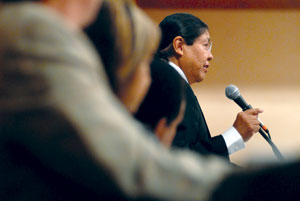At last week’s national Native American Procurement Conference in Kalispell participants took part in an event akin to speed dating. They were searching for the perfect mate, someone with all the right assets: similar goals, healthy financials and opportunity for lasting commitment.
The matchmaking meet-and-greet, though, was creating professional relationships instead of romantic ones. Every 10 minutes small business owners rotated to a new table to court business representatives ranging from Lockheed Martin, one of the world’s largest defense contractors, to state and federal agencies like the U.S. Army Corps of Engineers and the Montana and Arizona Departments of Transportation.
The one-on-one meetings were the culmination of the two-day event held Tuesday, Sept. 9, and Wednesday, Sept. 10, at the Hilton Garden Inn. The sixth-annual conference was hosted by the National Center for American Indian Enterprise Development (NCAID), a national, non-profit American Indian economic and business development organization. It was the first time the event was held in Montana.
The goal of the procurement conference, organizers say, is to bring small business communities together to encourage partnerships and increase competitiveness and opportunities in contracting.
 |
|
Speakers Clarence O’Berry, Monica Jojola and Ralph C. Thomas III, left to right, listen to Travis Parashonts, president of Suh’dutsing Technologies, LLC, tell the story of how his company became a cohesive business. |
“Our focus is in on Indian-owned businesses and tribal enterprises,” Lou Thompson, procurement counselor for the organization’s Kalispell office, said. “What we do though pertains to any small business that is looking to get into federal or government contracting.”
About 150 people attended the conference, where several government agencies and prime contractors gave presentations on how to successfully navigate their application processes, while executives from some of the largest American Indian or tribal-owned businesses offered their advice.
Keynote speaker Thomas Acevedo, chief executive officer of St. Ignatius-based S&K Technologies, said separation between tribal government and the business has been key to its success.
“It seems odd that I’m encouraging government and business to be separate at a time where our federal government is bailing out Fannie Mae and Freddie Mac,” Acevedo joked. “It’s just proof they don’t have it right yet either, so we can make mistakes, too.”
S&K Technologies, a spin-off of S&K Electronics in Pablo, is wholly owned by the Confederated Salish and Kootenai Tribes, but overseen by a board of directors apart from the tribe’s government. “That protects the business from the politics of the tribe, but also we’re not putting the tribal government at risk if the business fails,” Acevedo said.
 |
|
Lou Thompson, right, listens to a speaker during the Native American Procurement Conference at the Hilton Garden Inn. The event provided Indian suppliers the opportunity to meet with federal, state and corporate contacting officers or buyers. |
S&K provides information technology services primarily to the federal government’s defense and aerospace agencies. Like many of the businesses attending the conference, it is an “8(a)” contractor under small business administration rules. This is designed to give companies on Indian reservations or other economically or socially disadvantaged areas certain contractual preferences.
American Indian business owners need to take advantage of these opportunities to gain the edge over competitors, said Clarence O’Berry, president and CEO of Mandaree Enterprise Corporation, a tribally owned and operated technology business located on the Fort Berthold Indian Reservation in North Dakota.
“Learn, understand and then use your resources to beat your competition,” O’Berry said. “Tax benefits, geopolitical support, the tribe’s land base – those are all great ways to leverage with partners.”
Many American Indian business owners don’t realize there are programs to support them, Thompson said. In May, the NCAID’s branch office for marketing and procurement services moved from Polson to Depot Park in Kalispell, the same building that houses the city’s Chamber of Commerce.
The Kalispell branch office helps about 30 to 40 businesses each year navigate contracting from registration and certification to managing the contracts once they’re secured, Thompson said. The services are free for any business that’s majority-owned by an American Indian or tribe within Montana and Wyoming.
“Most of the challenges for these businesses are geographical,” Thompson said. “If you look at where the reservations in the two states are located they’re very remote and have a small population base.”
When the Cedar Band of Paiutes of Cedar City, Utah, started Suh’dutsing Technologies four years ago President Travis Parashonts said the tribe had little experience or funding. “We didn’t even know what IT was,” he joked. “We just said we were all ‘it.’” Today, though, he said the business acts as the “catalyst to economic development” on the reservation.
“We can’t afford to fail – Suh’dutsing Technologies is our casino,” he said. “Economic development, in my opinion, doesn’t run contrary to our culture. We have to survive.”